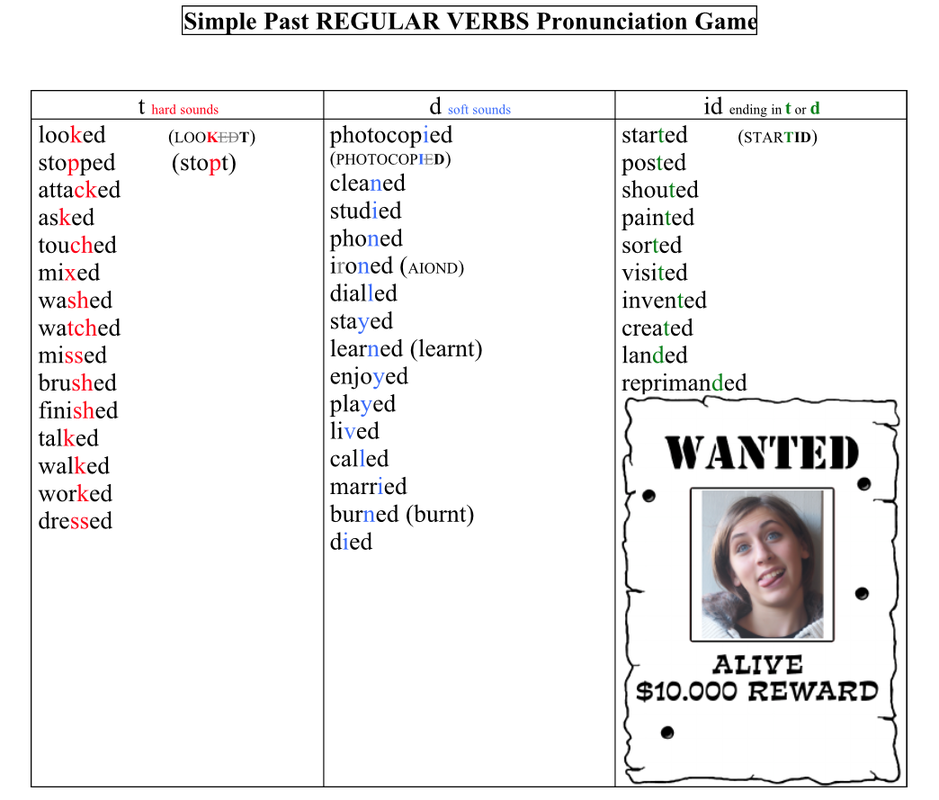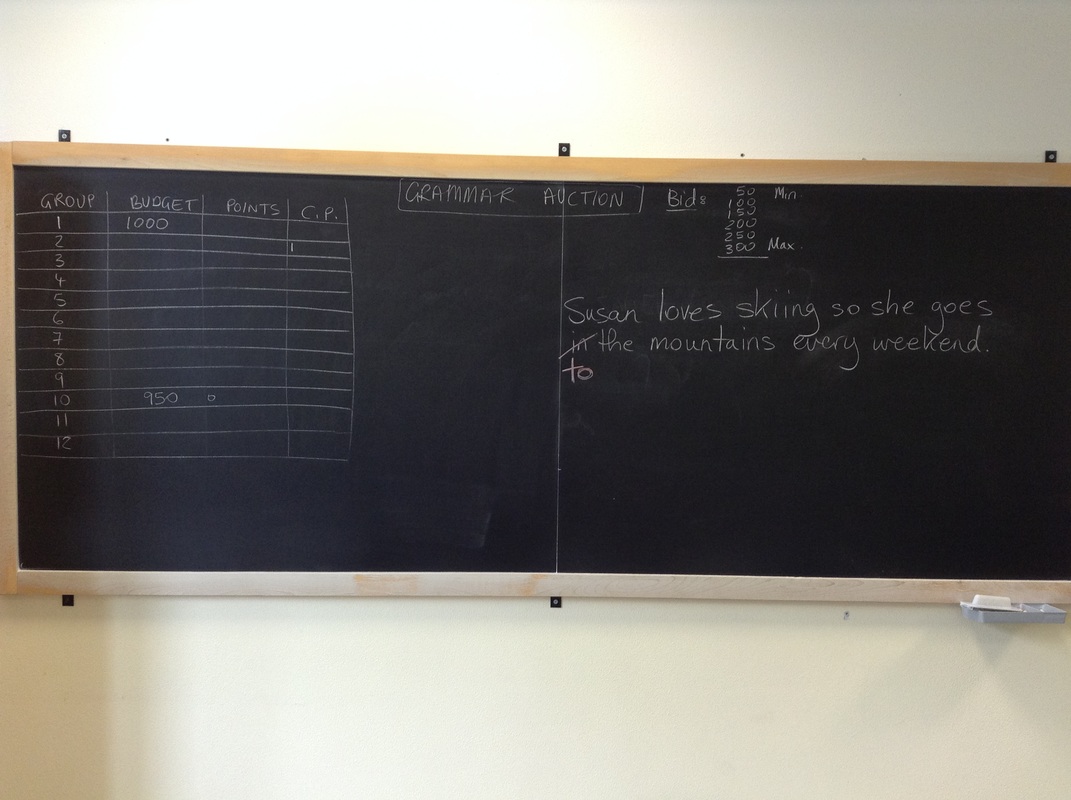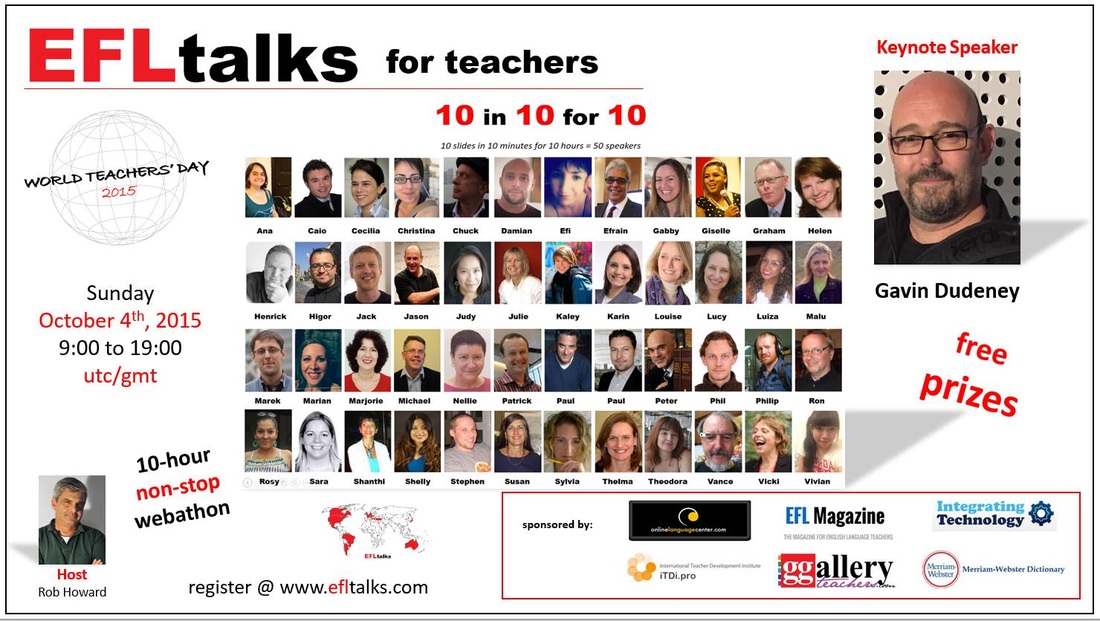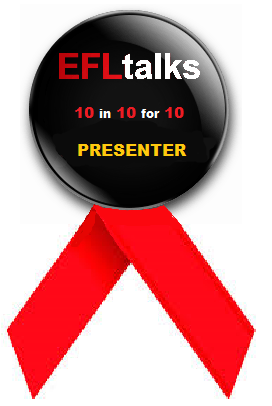|
Practising the pronunciation of REGULAR VERBS in the SIMPLE PAST is often underestimated due to the fact that everyone concentrates on learning the irregular verbs, deeming regular verbs to be easy. It is only when students read aloud in class that this necessity becomes apparent, often making my very long hair stand on end! As a result many years ago I made up this Simple Past REGULAR VERBS Pronunciation Game which you can download below. 1. First of all I refresh the students' memory by dividing the blackboard into three and distinguishing between the three pronunciations as on the photocopy. 2. We practise all together as I write some examples of verbs in three columns on the board. 3. Depending on the level of the students, I then leave it on the board to consult or rub it off. 4. Now it's time to divide the class into two teams and distribute one set of verbs to one team and a different set of verbs to the other team. NO WRITING is allowed as this is an oral skill to be practised. 5. The first team starts by each reading just one verb in turn until someone makes a mistake. 6. Then the other team reads theirs, just one verb per person until someone makes a mistake. 7. Then the first team STARTS FROM THE BEGINNING OF THE LIST again, but this time with another person reading so as NOT to always have the same people reading the same identical verbs as before. 8. The game proceeds taking turns, ALWAYS STARTING FROM THE TOP OF THE LIST AGAIN, until one team manages to read their list completely with making a mistake! 9. All this repetition helps them to fix the pronunciation in their minds and be more aware of it. 10. If there is time at the end of the lesson we also read "The Story of Willy the Kid" taken from the age-old Streamline Departures, filling in the gaps and pronouncing the verbs correctly (see download). There is also a very nice audio* of it to listen to and we even act it out time-permitting. * LISTEN TO AUDIO https://www.youtube.com/watch?v=IxXou87go7Q Hope you have fun with it! Susan
19 Comments
Songs always bring a breath of fresh air into the classroom and are greeted with joy. I usually try to choose songs, which are not only clear and fairly easy to understand but have meaningful content for language learners such as grammar, phrasal verbs or vocabulary pertinent to what we are studying.
For beginners/elementary students studying the Present Simple Tense I find that THE BOY DOES NOTHING – Alesha Dixon is rather fast and has difficult vocabulary but repetitively stresses the third person singular with a very catchy tune so that the very few gaps they have to fill in with easy words while listening can be easily managed. When checking their comprehension with the words they filled in, I ask them to spell the words so they can practise that too before I write the words on the board. All in all a fun consolidation activity. You can download the worksheets to the song below. Feel free to delete or translate the Italian into another language. Can anyone suggest any other songs for practising the Present Simple Tense? Hope you have fun with it! Susan
If you have problems downloading these files (they work for me but apparently not for everyone) please contact me at [email protected] - thank you!
By the far the best and most versatile grammar revision game I have ever used is probably not new to many of you, but while many ‘tried and tested’ games I have borrowed from others have not always had the desired results, this one has had a 98% success rate* in my classes of all ages from children to adults. NO PREPARATION is required, which for my extensive range of teaching (toddlers to adults – I know it’s crazy but I love the variety it brings in teaching methods despite the heavy preparation workload) is very welcome, but it is a MOST EFFECTIVE, HIGHLY FOCUSED form of FUN GRAMMAR REVISION.
It’s the GRAMMAR AUCTION 1. Divide the class into groups of 2 – 3 students. 2. Write a column on the board listing the GROUPS and next to it a column assigning each of them a BUDGET of 1000 Euro. 3.Two more columns are for POINTS and C.P. (Correction Points) 4. Explain that the objective is spending money to buy correct sentences and thus win a point. The group with the most points wins at the end of the lesson or time allocated to it. 5. Minimum bid is 50 euro, then 100, 150, 200, 250 to a max bid of 300 euro. They are not allowed to jump to a higher sum without having bid the previous sum (no 300 euro directly!!). THEY MUST SAY THE SUM OF THE BID THEMSELVES (you would be surprised and how much difficulty some students have in saying these numbers!). 6. Write a sentence on the board, have them bid and then write the remaining budget next to the group that bought the sentence. 7. Now ask, “Did they spend their money well or badly?” 8. Those who reply “badly” should motivate the mistake they see and try to correct it. If they do they get a correction point. If the sentence is correct the group that bought the sentence eventually gets their point. 9. I like to make the “simmer” before letting them know if the sentence is right or wrong so they end up making lots of hypotheses even when the sentence is right. 10. If the group that bought it suddenly realises there is a mistake I give them first option to correct it. 11.*The only time it gets out of hand is when the students bid just for the sake of it without even reading the sentence and not caring if it’s right or wrong. I’ve very rarely had the situation, in which case the game stops as the objective has been defeated. 12. All in all it’s a very fun game with lots of useful revision without them even noticing it! Hope you have fun with it! Susan
|
Categories
All
Would you like regular English learning & teaching ideas? Subscribe to my blog so you don't miss a post!
AuthorMy name is Susan Brodar, born in London into a multilingual family and brought up bilingual English / Italian. Archives
December 2018
|
||||||||||||||||||||||||||||||||||||||||||||||||||||||||||||








 RSS Feed
RSS Feed





